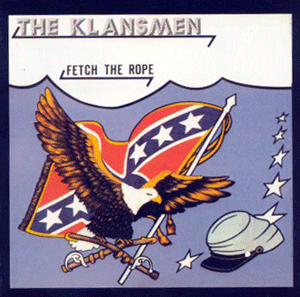As Apple Moves to Remove Hate Music from iTunes, Other Retailers Remain
In the aftermath of a Southern Poverty Law Center report that found dozens of hate bands being sold openly on iTunes, Apple has begun the process of removing white power music that violates its terms of use agreement from the iTunes catalog.
The SPLC report, published in the latest Intelligence Report, found that at least 54 white power bands had listings with iTunes, the world’s largest online music retailer, in spite of violating to Apple’s terms of use. As of today, Apple had removed 21 bands, and a representative from the company told Hatewatch that the remaining 33 are currently being reviewed.
But, other retail giants that white power bands have used, like Spotify and Amazon, have been far less willing to quiet the music of hate they provide.
A separate investigation, conducted by Noisey, found that Spotify and Amazon were no better at enforcing their own standards. For example, artists such as Ian Stuart (the late lead vocalist/guitarist for the seminal, white power band Skrewdriver), Young Blood, Absurd, Bilskirnir, and Arghoslent were listed in Spotify’s catalog, despite a terms and conditions of use agreement that states, “Don’t engage in any activity on the Service or upload User Content, including registering and/or using a username, which is or includes material that (a) is offensive, abusive, defamatory, pornographic, or obscene; (b) is illegal, or intended to promote or commit an illegal act of any kind; … (e) is intended or does harass or bully other users.”
What is even more concerning is that albums by Ian Stuart and the Klansmen have been reclassified under other names. Songs like “G---- Ears,” “Johnny Joined the K.,” and most disturbingly, the title track from the album, “Fetch the Rope” can be played by anyone of Spotify’s 50 million listeners.
“The good old boys they kept their trust despite the rising crime / Clean white robes, good strong ropes, they’re just doing fine,” the lyrics to “Fetch the Rope” read before the refrain. “I said, don’t give up hope / Well they can cope / Don’t give up hope / Fetch that rope.”
The concern surrounding the online proliferation of hate music, especially through such large distributors like Apple, is in outreach more than money. On Spotify, for example, artists receive just over half a cent each time a song is played. However, for the radical right, which has long used white power music as one of its most effective recruitment tools, the exposure through these services is even more valuable than the minor royalties.
When contacted for comment by Hatewatch, Spotify insisted, “We take this very seriously” and asked for a list of songs currently available for streaming. “Content (artists and music) listed by the BPjM in Germany (Bundesprüfstelle für jugendgefährdende Medien/Federal Department for Media Harmful to Young Persons) is proactively removed from our service. We’re a global company, so we use the BPjM index as a global standard for these issues. Other potentially hateful or objectionable content that is flagged by users or others but not on the BPjM list is handled on a case by case basis,” said Spotify spokesman Graham James.
But as of today, Spotify has not removed any songs from a list of hate music provided by Hatewatch.
Amazon, perhaps the largest funder of hate groups in America, is no better. Noisey found releases from Skrewdriver, The Bully Boys, Brutal Attack, Max Resist, Young Blood, Absurd, Kristallnacht, Blikskirnir, and Arghoslent in their MP3 catalog—a small fraction of what is available on Amazon, one of the largest retailer of hate music and merchandise.
Not that they lack the means to enforce the removal of hate music.
“Listings for items that Amazon deems offensive are prohibited on Amazon.com,” reads Amazon’s offensive products disclaimer, which, in addition to Amazon’s participation agreement, governs the Amazon marketplace. “Examples of Prohibited Listings: Products that promote or glorify hatred, violence, racial, sexual or religious intolerance or promote organizations with such view.”
Albums like Skrewdriver’s “White Rider,” which features a mounted Klansman in full regalia on its cover are available in both MP3 and physical form, along with a laundry list of other releases. In the comment section, White Nationalists enthusiastically praise it, along with its availability on Amazon.
But Amazon has staunchly resisted addressing any such violation to their terms and conditions. Their affiliates program, which pays a commission of purchases made after accessing Amazon through a specific link, remains a major source of revenue for racist websites.
Among those hate groups using the service are racist publishing houses like Counter-Currents and VDARE that receive 7.5% and 10% commissions from Amazon for referrals, respectively.
So far, Amazon has made no action to prevent hate groups from using the program, and an Amazon representative denied a request for comment.
With companies like Apple taking proactive steps to come into compliance with their own usage agreements, its competitors have responded less than enthusiastically to similar requests about their own contradictory practices. It remains to be seen whether Spotify and Amazon will honor the non-discriminatory policies that they purportedly value.


